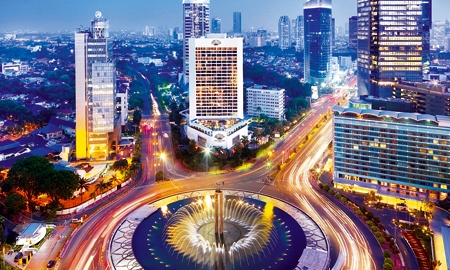Indonesia can proudly lay claim to being one of the most consistent and best-performing economies of the new millennium. GDP growth has averaged 5.8 per cent since 2004, fuelled in large part by huge domestic demand. Even in the worst of the crisis years, Indonesia’s economic expansion only dipped to 4 per cent in 2009, then rallying back to an impressive 6.5 per cent two years later.
“Indonesia isn’t a new story. It has been growing like this for a decade. The boundaries in Asia are the 1997-98 Asian Financial Crisis, not the Lehman Brothers crisis,” says James Castle, founder of Castle Asia, manager of the largest and most prestigious CEO forum in Indonesia.
“But if you go back further, again Indonesia was one of the fastest growing countries in the world. There’s nothing new or unusual about it; the norm in Indonesia is stability and rapid growth.”
Business relationships between Indonesia and the UK can be traced back several decades, but there is still huge potential for more. Prime Minister David Cameron visited Jakarta in April 2012 with the largest delegation ever brought to Southeast Asia, and seven months later President Susilo Bambang Yudhoyono (or SBY as he is commonly called) returned the visit, becoming the first Indonesian head of state to visit London since 1979. One of the agreed targets set by the two country heads was to double bilateral trade from their 2011 levels, by 2015.
Commenting on the good business relations between the two countries, Chris Wren, Executive Director of the British Chamber of Commerce in Indonesia (BritCham), says: “The most prominent tie is the banking and financial services sector. Recently, Prudential was formally announced as the largest insurer in Indonesia. Many people do not realise it, but this year Standard Chartered celebrate their 150th anniversary in Indonesia.
“In terms of fast moving consumer goods, Unilever set up their 18th or 19th production plant a few years ago, under fierce competition for it to be in other Asian countries.”
Bad publicity has marred Indonesia’s fame, yet this is the classic case where good news simply doesn’t make the headlines.
“The country obviously needs to continue to improve its game on the promotional side, because I think the perception of Indonesia is not as positive as the opportunities,” laments Mr Castle.
Despite this media imbalance, investments from around the world have been steadily pouring in, and no doubt Fitch Ratings and Moody’s upgrading Indonesia’s sovereign credit rating to investment grade two years ago merely served to bolster investor confidence.
There is one major hindrance to Indonesia’s rise and climb to the top 10: infrastructure development in this archipelago of more than 17,500 islands.
In April, the Transportation Ministry issued a medium-term transport road map that dictates the development of railway and seaport infrastructure – the latter of which has been designated $12.4 billion between 2015 and 2019 – in more than a dozen cities across the archipelago.
why we need to upgrade railway and shipping infrastructure,” Deputy Minister of Transportation Bambang Susantono said, adding that he hopes the private sector will increase its participation in these types of projects.
“We have been developing at an average rate of 5 to 6 per cent over the past several years. We can achieve more than this if we have better infrastructure. I think we can imitate the experience of China, which has grown at a rate of 9 or 10 per cent, with good infrastructure,” says Agus Tjahajana, Director General for International Industrial Cooperation (part of the Ministry of Industry).
He remarks that British investment would be well put to use in the public private partnership (PPPs) model for infrastructure development.
BritCham can be of vital use to British investors interested in the extraordinary opportunities Indonesia affords. Mr Wren says that the chamber specialises in “matchmaking” and “networking”, whilst warning investors not to go looking to turn a quick profit.
“Indonesia is for companies that have the financial resources to be able to take on a longer term perspective in terms of ROI. Companies that can do that can probably join the list of very successful companies and enjoy a very long-term sustainable and prosperous relationship with this market,” he explains.
APEC 2013
The
Asia-Pacific Economic Cooperation (
APEC) is a unique intergovernmental forum for facilitating economic growth, trade, investment and cooperation in the region. There are 21 member economies, all of which have a coastline facing the Pacific Ocean, including The Russian Federation, USA, Canada, Australia, Hong Kong and South Korea, among many others. Put together, these 21 economies comprise approximately 44 per cent of world trade and around 55 per cent of world GDP.
Last year Indonesia played host and chair of APEC for the second time, under the theme “Resilient Asia-Pacific, Engine of Global Growth”. The first time Indonesia hosted APEC, in 1994, a fundamental step was taken with the signing of the ‘Bogor Goals’ of free and open trade and investment. Last year’s goals mainly revolved around improving the resilience of the regional economy in the context of the ongoing global economic recession.

0 COMMENTS